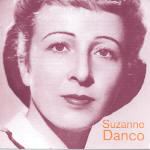The disc in Decca’s The Singers series devoted to Belgian soprano Suzanne Danco differs from most of its companions in that it’s a delight from start to finish, with a knowing selection that portrays her varied repertoire. Danco was a light lyric soprano in the French tradition, a prolific recording artist for Decca in the waning days of 78s and the early ones of LPs. Hers was a voice distinguished by its purity–small wonder why Ernest Ansermet chose her for his first recording of Pelléas et Mélisande. As an interpreter she embodied contradictory virtues, an overall coolness coupled with surprising passion when the music required it, yet a passion that smolders, never bursting into flame. She could point the text, but without ever breaking the line or calling attention to such little emphases–a skill that often becomes apparent only after several hearings of a piece, when it can be savored all the more for its subtlety. Add to her cool style a narrow vibrato and focused pitch, and “elegant” is the word that comes to mind about Danco’s singing. Unfortunately, elegance is a quality rarely in evidence these days, often carrying the pejorative connotation of “emotionless” or “cold”, qualities furthest from what we hear on this disc.
The slow crawl of Dido’s “When I am laid to earth” is a shock at first, but Danco convinces through her immaculate English diction and the passion with which she invests every phrase. Stylistically authentic? No, but who gives a damn! The Gluck aria from Alceste often is heard sung by Isoldes and Brunnhildes. Danco brings it off, just barely, thanks to the close microphoning; but although she lacks the sheer tonal power for the big moments, she excels in the softer phrases where her bigger sisters fall short. Her immaculate French and typically Gallic nasal pronunciation are further attractions. Her Cherubino is more than just a reminder that she recorded the role in Erich Kleiber’s classic recording–it’s about as sweet a “Voi che sapete” as I’ve heard in years. In “Come scoglio”, she lacks some of the fire others have brought to the aria. In Violetta’s big Act 1 scene from Traviata, you admire the fluency and involvement of her singing while missing Italianite warmth and wanting deeper resources when the tone broadens out.
In the French repertoire though, there’s no room for carping. She’s moving as Manon, touching as Louise, and hers is one of the fortunate recordings of Micaela’s Carmen aria in which style, diction, and timbre combine to create a convincing scene. The Debussy songs are close to perfection while the Strauss songs illustrate her sensitive lieder singing; they’re idiomatic even though somewhat heavier voices score more points. Routine orchestral accompaniments don’t get in the way; Guido Agosti’s light-fingered piano in the Strauss and Debussy songs is a plus.
The sound on these recordings, made between 1947 and 1952, is adequate, though there’s an acid touch to the papery violins and the upper reaches of the piano and the voice takes on a slight edginess at times. I’m getting tired complaining about the multimedia add-ons to The Singers discs, so I’ll just warn you that texts and translations on this one, like the others, are accessible only via your computer’s CD-ROM drive. If you don’t know Danco’s recordings, get this. If you do know them, you won’t need my prodding.
































